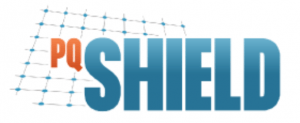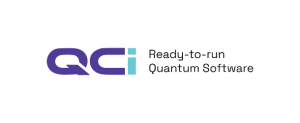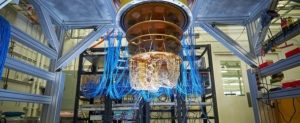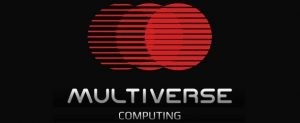Quantum News Briefs July 14: PQShield selected to participate in AWS European Defence Accelerator, QCi awarded subcontract for innovative atmospheric monitoring technology for NASA Ames; Google claims quantum supremacy over traditional supercomputers once more + MORE

Quantum News Briefs July 14: PQShield selected to participate in AWS European Defence Accelerator, QCi awarded subcontract for innovative atmospheric monitoring technology for NASA Ames; Google claims quantum supremacy over traditional supercomputers once more + MORE
PQShield selected to participate in AWS European Defence Accelerator
 PQShield has been selected by AWS to participate in its AWS European Defence Accelerator, to advance the development and deployment of cutting-edge quantum-resistant encryption technology. Quantum News Briefs summarizes.
PQShield has been selected by AWS to participate in its AWS European Defence Accelerator, to advance the development and deployment of cutting-edge quantum-resistant encryption technology. Quantum News Briefs summarizes.
This collaboration elevates PQShield’s ability to support defense and national security organizations across Europe and addresses four key focus areas of the defense industry’s needs identified by the AWS European Defence Accelerator.
Energy Resilience:
Cryptography plays a pivotal role in securing critical national infrastructure (CNI), as it remains a primary target for nation-state attacks. PQShield’s innovative cryptographic solutions will bolster the energy sector’s resilience, protecting vital assets and ensuring uninterrupted service.
Secure Information Sharing:
Confidentiality and integrity are paramount in secure information sharing. PQShield’s advanced encryption algorithms provide robust protection for sensitive data, guaranteeing its confidentiality and integrity during transmission and storage.
Quantum:
As quantum advancements accelerate, the need for quantum-safe cryptography becomes increasingly urgent. PQShield is at the forefront of this evolving field, developing and implementing cryptographic solutions that can withstand the power of quantum computers. This collaboration will enable rapid advancements in the realm of quantum cryptography.
Cyber Resilience:
Beginning in September 2023, the AWS European Defence Accelerator is a four-week technical, business, and mentorship program delivered in collaboration with Plexal, a United Kingdom Government supported innovation technology firm. Participating start-ups are eligible to receive AWS computing credits, specialized AWS training, mentoring from defense and national security domain and technical subject matter experts, business development, go-to-market advice, and investment guidance. To further accelerate their solutions’ go-to-market opportunities, the cohort companies will have the chance to connect with AWS defense customers, industry leaders, and members of AWS Partner Network (APN) looking for defense solutions. Click here to read the announcement in-entirety on the PQShield website.
QCi awarded subcontract for innovative atmospheric monitoring technology for NASA Ames
 Quantum Computing Inc. (QCi) announced a subcontract award on July 13 from Bay Area Environmental Research Institute (BAERI) to build and test for NASA Ames an innovative photonic sensor instrument to provide accurate measurement of atmospheric particulates such as clouds, aerosols, smoke flume, volcanic ashes, etc., in order to identify physical properties including size, shape and chemical composition. Quantum News Briefs summarizes.
Quantum Computing Inc. (QCi) announced a subcontract award on July 13 from Bay Area Environmental Research Institute (BAERI) to build and test for NASA Ames an innovative photonic sensor instrument to provide accurate measurement of atmospheric particulates such as clouds, aerosols, smoke flume, volcanic ashes, etc., in order to identify physical properties including size, shape and chemical composition. Quantum News Briefs summarizes.
This award represents the third distinct task order from NASA and is the second research center within NASA to subcontract with the Company. Delivery of the photonic sensor is expected during the first quarter of 2024.
QCi, through its wholly owned federal contracting subsidiary, QI Solutions, will perform this work under a subcontract from BAERI. BAERI is a scientist-founded non-profit research institute, headquartered within NASA facilities, and dedicated to promoting and enabling scientific research in atmospheric and space sciences. The objective of the project is to build and test a new photonic sensor instrument that can provide a more accurate measurement of scattering when laser light travels through clouds and aerosols than is possible with existing instruments.
Under the nine-month subcontract, QCi will deliver a compact system, programmed to process a substantial amount of data that can support standalone operations for days, and designed to be powered by a 12-volt battery that consumes no more than 30 watts of power. In addition, QCi will generate reports that will detail the operation of the system in a realistic environment, provide the range of parameters and offer predictive analyses on future enhancements with a possible long-term objective to position these instruments for field deployment to create a monitoring network.
Dr. William McGann, QCi’s CTO commented: “This proposed instrument includes innovations in both optical systems and in the physics principles behind the measurement concept. Current state-of-the-art instruments use optical components that have existed for many decades and are big and clumsy. The proposed instrument will use state-of-the art optical components developed in the quantum optics community, to measure the optical properties (extinction coefficient and backscatter coefficient) of clouds and aerosols at multi-wavelengths. We use the optical property data to derive physical properties (particle size, cloud water content, particle number concentrations) and the chemical composition of clouds and aerosols (smoke, fog, gas). This approach is expected to be a significant improvement over existing instruments because it will measure both forward and backward scattering and multiple forms of polarization simultaneously. The benefits of this instrument are considerable, producing far greater accuracy in situ measurements of cloud and aerosol extinction coefficients from aircrafts.” Click here to read entire news announcement.
Google claims quantum supremacy over traditional supercomputers once more

Google has now declared that the competition against traditional computing is finally over. Quantum computers have reached a level of power that modern (or even future) supercomputers will not be able to attain, the search giant claimed. However, not everyone in the quantum community is completely convinced by this bombastic statement according to Alfonso Maruccia in his July 13 article in TechSpot. Quantum News Briefs summarizes.
As reported by The Telegraph, a recent research paper authored by the Google Quantum AI team and multiple collaborators states that the new experimental quantum machine surpasses the capabilities of existing classical supercomputers. The paper, titled “Phase transition in Random Circuit Sampling,” addresses the issue of noise in quantum computers.
Google announced that it has successfully assembled 70 qubits, a significant increase compared to the 53 qubits found in a device from 2019. This advancement has enabled the company to achieve a groundbreaking level of quantum supremacy over contemporary supercomputers relying on CPUs and GPUs. While the most powerful HPC system available today (Frontier) could match a calculation made by the previous quantum device in 6.18 seconds, Google said it would take the same machine 47.2 years to match the power of the 70-qubit system.
Google’s next-gen quantum computer is 241 million times more powerful than the 2019 device. It is also more powerful than recent quantum demonstrations from Chinese researchers, and it should put an end to the quantum supremacy controversy as it is “firmly in the regime of beyond-classical quantum computation.” Click here to read article in-entirety.
Multiverse Computing, Iberdrola partner to use quantum computing optimization to green up power grids
 Multiverse Computing announced on July 6 a joint project with multinational clean energy firm Iberdrola to modernize electrical grids and facilitate additional green energy sources. Quantum News Briefs summarizes.
Multiverse Computing announced on July 6 a joint project with multinational clean energy firm Iberdrola to modernize electrical grids and facilitate additional green energy sources. Quantum News Briefs summarizes.
Because electrical grids are integrating increasing amounts of renewable generation, electric vehicles and other distributed energy resources, supplemental batteries are playing a vital role. i-DE, Iberdrola’s distributor in Spain and a leader in smart grids, will work with Multiverse Computing to select the optimal number, type and locations of supplemental batteries for the electrical grid.
Iberdrola, Europe’s largest electricity utility by market capitalization, and the second largest in the world, is a leader in renewables, spearheading the energy transition to a low carbon economy. The group supplies energy to almost 100 million people in dozens of countries.
Many variables must be considered when determining battery placement within smart grids, such as connections with neighboring power systems, flexibility in existing generation sources, and the hourly, daily, and seasonal changes in power demands. Multiverse’s quantum algorithm experts will use quantum and quantum-inspired algorithms to solve these computationally complex problems, which classical computers cannot manage.
The two companies will work together for 10 months as part of the Gipuzkoa Quantum Program in the Basque Country of Spain, a quantum computing hub and smart grid innovation center. Click here to read announcement in-entirety on Multiverse site.
Sandra K. Helsel, Ph.D. has been researching and reporting on frontier technologies since 1990. She has her Ph.D. from the University of Arizona.





















